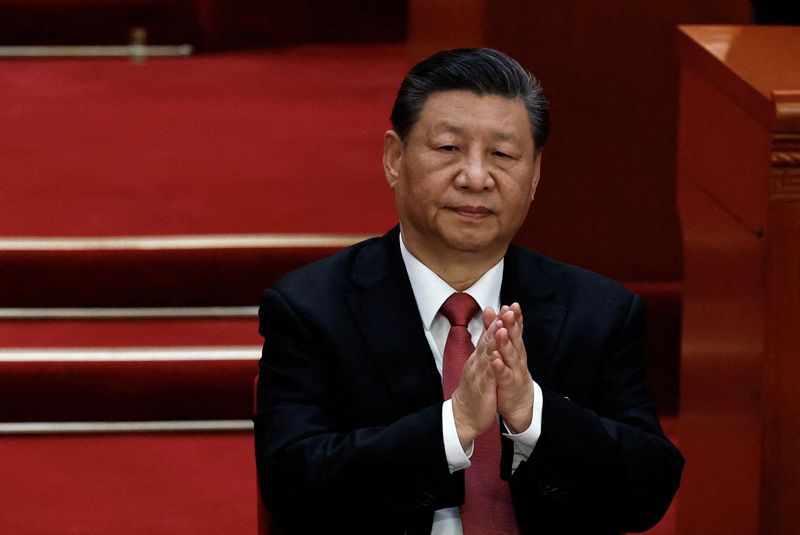By Ryan Woo
BEIJING (Reuters) - A sentence from a months-old speech by Chinese President Xi Jinping has sparked speculation the central bank might start aggressively buying government bonds to support the economy, a stimulus measure China has long shunned.
But most analysts say the People's Bank of China (PBOC) will stick with traditional tools rather than resorting to massive liquidity injections through "quantitative easing" (QE), as some major economies such as Japan and the United States have done.
Market expectations remain high for more stimulus to boost the world's second-largest economy, which is showing tentative signs of momentum despite a long-running debt crisis in the property sector, which used to account for a quarter of China's gross domestic product.
"The People's Bank of China must slowly increase the trading of treasury bonds in its open market operations," Xi told a major financial meeting in October in a speech that was not published at the time but was included in a book this month.
The Hong Kong-based South China Morning Post cited an excerpt of the speech on Thursday from the book, triggering market talk about how to interpret Xi's words against the backdrop of the PBOC's reluctance to flood the system with liquidity due to fears of inflation and asset bubbles.
China's blue-chip stock index bounced 0.5% off one-month lows on Thursday. On Friday, 10-year treasury bond futures rose the most in three weeks.
The speculation also reflects investor sensitivity to comments made by Xi, China's president for 11 years and its most powerful ruler since Mao Zedong.
The PBOC did not immediately respond to a request for comment.
LIQUIDITY AMPLE, ROOM TO CUT RATES
Xi's speech was "not buying government bonds in the primary market, therefore not an indication of QE", said Morgan Stanley's chief China economist, Robin Xing.
"In fact, in the same speech, Beijing made hawkish comments that the deleveraging process requires a tighter grip on money and credit supply, which we believe indicates continued preference for austerity to prevent misallocations," Xing said in a note to investors.
The PBOC is not allowed to buy bonds directly from the central government. It last bought them in the secondary market in 2007.
Xi was "calling for replenishing the central bank's monetary policy toolkit", including expanding its options in open-market trading of government bonds to manage liquidity, said Tao Wang, head of Asia economics and chief China economist at UBS Investment Bank.
Guolian Securities economist Rocky Fan said the PBOC could buy treasury bonds while reducing reverse repurchases, replacing one with the other.
Among other traditional policy tools, PBOC Deputy Governor Xuan Changneng said last week that cutting commercial banks' reserve requirement ratios, now averaging around 7% after a 50-basis-point cut in January, would be an important way to inject liquidity.
Last month, the PBOC cut its five-year loan prime rate by 25 basis points to 3.95%, the most since the reference rate was introduced in 2019.
The PBOC last cut the rate on one-year medium-term lending facility loans, a guide to the loan prime rate, by 15 basis points to 2.50% in August.
"(Other) central banks are doing QE because their policy rates are close to zero and they can't cut any further, but the PBOC still has room to cut its policy rate, which is now 2.5%," Macquarie economists wrote in a note.
China is targeting 3.9 trillion yuan ($540 billion) in local government special bond issuance this year to support the economy, up from 3.8 trillion yuan last year, and 1 trillion yuan in special ultra-long term treasury bonds to help key sectors.
Reflecting high demand for bonds and the ample liquidity in the financial system, China's 30-year treasuries yield around 2.47%, near this month's record low of 2.442%.

"Whether you look at money supply or the level of interest rates, the degree of monetary easing we've experienced has rarely been seen in history," said Xia Chun, chief economist at Forthright Holdings.
($1 = 7.2239 Chinese yuan renminbi)